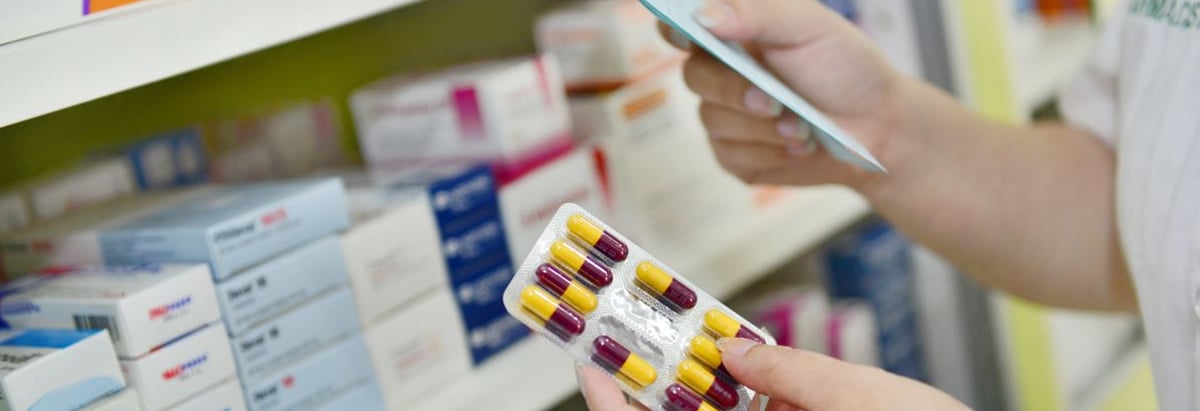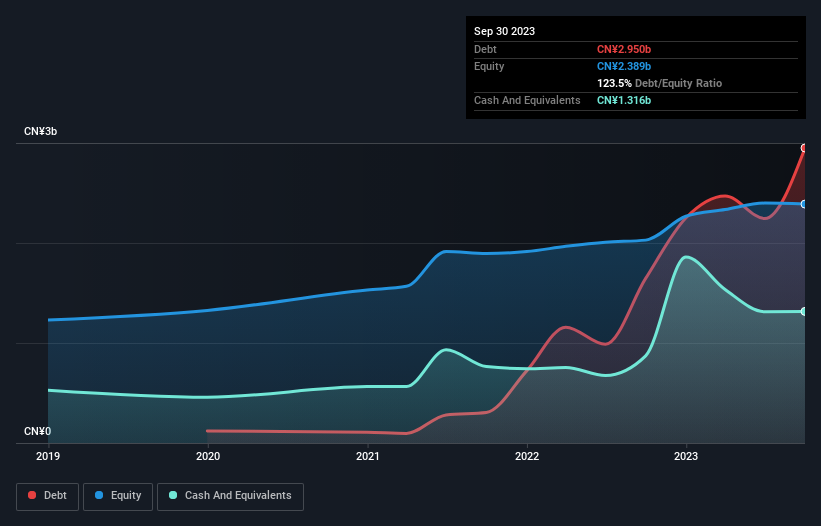- China
- /
- Food and Staples Retail
- /
- SZSE:301017
These 4 Measures Indicate That ShuYu Civilian Pharmacy (SZSE:301017) Is Using Debt Extensively

The external fund manager backed by Berkshire Hathaway's Charlie Munger, Li Lu, makes no bones about it when he says 'The biggest investment risk is not the volatility of prices, but whether you will suffer a permanent loss of capital.' It's only natural to consider a company's balance sheet when you examine how risky it is, since debt is often involved when a business collapses. As with many other companies ShuYu Civilian Pharmacy Corp., Ltd. (SZSE:301017) makes use of debt. But is this debt a concern to shareholders?
Why Does Debt Bring Risk?
Debt and other liabilities become risky for a business when it cannot easily fulfill those obligations, either with free cash flow or by raising capital at an attractive price. Ultimately, if the company can't fulfill its legal obligations to repay debt, shareholders could walk away with nothing. However, a more frequent (but still costly) occurrence is where a company must issue shares at bargain-basement prices, permanently diluting shareholders, just to shore up its balance sheet. By replacing dilution, though, debt can be an extremely good tool for businesses that need capital to invest in growth at high rates of return. When we examine debt levels, we first consider both cash and debt levels, together.
View our latest analysis for ShuYu Civilian Pharmacy
How Much Debt Does ShuYu Civilian Pharmacy Carry?
The image below, which you can click on for greater detail, shows that at September 2023 ShuYu Civilian Pharmacy had debt of CN¥2.95b, up from CN¥1.65b in one year. However, it does have CN¥1.32b in cash offsetting this, leading to net debt of about CN¥1.63b.

How Healthy Is ShuYu Civilian Pharmacy's Balance Sheet?
Zooming in on the latest balance sheet data, we can see that ShuYu Civilian Pharmacy had liabilities of CN¥4.56b due within 12 months and liabilities of CN¥1.87b due beyond that. Offsetting these obligations, it had cash of CN¥1.32b as well as receivables valued at CN¥1.25b due within 12 months. So it has liabilities totalling CN¥3.86b more than its cash and near-term receivables, combined.
This is a mountain of leverage relative to its market capitalization of CN¥5.78b. Should its lenders demand that it shore up the balance sheet, shareholders would likely face severe dilution.
In order to size up a company's debt relative to its earnings, we calculate its net debt divided by its earnings before interest, tax, depreciation, and amortization (EBITDA) and its earnings before interest and tax (EBIT) divided by its interest expense (its interest cover). The advantage of this approach is that we take into account both the absolute quantum of debt (with net debt to EBITDA) and the actual interest expenses associated with that debt (with its interest cover ratio).
ShuYu Civilian Pharmacy's debt is 3.0 times its EBITDA, and its EBIT cover its interest expense 4.8 times over. This suggests that while the debt levels are significant, we'd stop short of calling them problematic. Notably, ShuYu Civilian Pharmacy's EBIT launched higher than Elon Musk, gaining a whopping 115% on last year. The balance sheet is clearly the area to focus on when you are analysing debt. But you can't view debt in total isolation; since ShuYu Civilian Pharmacy will need earnings to service that debt. So if you're keen to discover more about its earnings, it might be worth checking out this graph of its long term earnings trend.
But our final consideration is also important, because a company cannot pay debt with paper profits; it needs cold hard cash. So we clearly need to look at whether that EBIT is leading to corresponding free cash flow. Over the last three years, ShuYu Civilian Pharmacy reported free cash flow worth 13% of its EBIT, which is really quite low. For us, cash conversion that low sparks a little paranoia about is ability to extinguish debt.
Our View
ShuYu Civilian Pharmacy's conversion of EBIT to free cash flow and level of total liabilities definitely weigh on it, in our esteem. But the good news is it seems to be able to grow its EBIT with ease. Looking at all the angles mentioned above, it does seem to us that ShuYu Civilian Pharmacy is a somewhat risky investment as a result of its debt. Not all risk is bad, as it can boost share price returns if it pays off, but this debt risk is worth keeping in mind. There's no doubt that we learn most about debt from the balance sheet. But ultimately, every company can contain risks that exist outside of the balance sheet. Case in point: We've spotted 2 warning signs for ShuYu Civilian Pharmacy you should be aware of, and 1 of them doesn't sit too well with us.
If, after all that, you're more interested in a fast growing company with a rock-solid balance sheet, then check out our list of net cash growth stocks without delay.
New: Manage All Your Stock Portfolios in One Place
We've created the ultimate portfolio companion for stock investors, and it's free.
• Connect an unlimited number of Portfolios and see your total in one currency
• Be alerted to new Warning Signs or Risks via email or mobile
• Track the Fair Value of your stocks
Have feedback on this article? Concerned about the content? Get in touch with us directly. Alternatively, email editorial-team (at) simplywallst.com.
This article by Simply Wall St is general in nature. We provide commentary based on historical data and analyst forecasts only using an unbiased methodology and our articles are not intended to be financial advice. It does not constitute a recommendation to buy or sell any stock, and does not take account of your objectives, or your financial situation. We aim to bring you long-term focused analysis driven by fundamental data. Note that our analysis may not factor in the latest price-sensitive company announcements or qualitative material. Simply Wall St has no position in any stocks mentioned.
About SZSE:301017
ShuYu Civilian Pharmacy
Operates a chain of pharmaceutical retail stores in China.
Slightly overvalued with imperfect balance sheet.
Market Insights
Community Narratives




